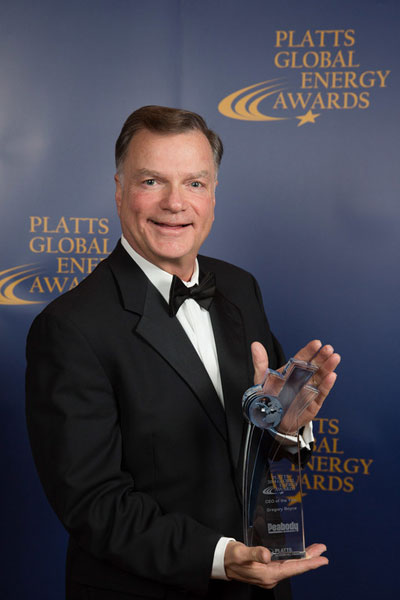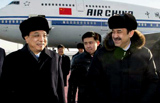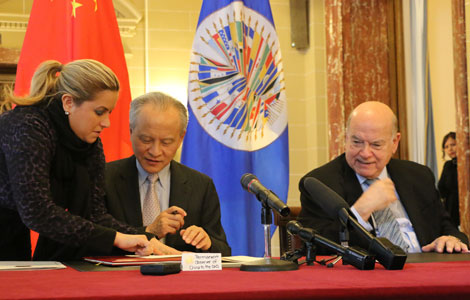Coal to remain vital to China despite climate pact with US
Updated: 2014-12-13 06:40
By PAUL WELITZKIN in New York(China Daily USA)
|
||||||||
 |
|
Gregory Boyce is CEO of Peabody Energy. Provided to China Daily |
Coal will continue to be the most important energy source for China despite an agreement with the United States that mandates cuts in greenhouse gas emissions from the world's two largest economies over the next two decades, said the CEO of coal giant Peabody Energy Corporation.
"Over 70 percent of all energy in China comes from coal," Gregory Boyce, chairman and CEO of St. Louis-based Peabody, told China Daily in an interview. "China will remain dependent on coal but will seek to take advantage of new technologies to reduce emissions."
Boyce said part of the agreement between China and US in November included a provision that both countries will do more to advance carbon capture or carbon capture utilization and storage (CCUS) technology. CCUS seeks to remove carbon dioxide from coal burning by storing it underground or reusing it. "We've been saying for a long time that we need a higher level of government emphasis on this and now we have it," said Boyer.
Peabody is heavily involved in China. The company has what it describes as a "strong relationship" with the Chinese government on the central and local levels, including Xinjiang and Inner Mongolia. Peabody supplies metallurgical coal (used in steel making) and thermal coal (used for electricity and heating). The company is also working with Xinjiang province to evaluate building a large scale surface mining project.
Peabody is the only foreign investor involved in China's first near zero emission IGCC demonstration project called GreenGen in Tianjin. The plant was commissioned in 2013 to generate 250 megawatts of electricity through a coal gasification process that will provide CO2 to the Bohai Bay oil field for enhanced oil recovery application.
Boyce acknowledged that coal has an image problem. "We need to do a better job of telling everyone that coal is used differently today and our ability to capture emissions is so much more advanced," he said.
Boyce said he doesn't oppose coal sharing the energy platform with renewable energy sources like solar and wind. "The world is short of energy and we can't have enough energy sources," said Boyce. "Renewables need a backup because the sun doesn't always shine and the wind doesn't always blow. We can have a healthy symbiotic relationship with renewables and I include nuclear in that as well."
Boyce said that now renewables account for about 2 percent of the energy mix. "So even if you double or triple that amount you will still need coal and other sources for the majority of power."
On Dec 11, Boyce was named CEO of the Year and Peabody was named Energy Company of the Year at the 16th annual Platts Global Energy Awards in New York. Boyce topped a field that included Chengyu Fu and Fanrong Li, the CEOs of China Petroleum and Chemical Corp (Sinopec Group) and CNOOC Group Ltd respectively.
"This was great recognition for our team here and the 8,000 employees of this great company. I am proud of how this organization conducts itself not only on a business level but also in terms of social responsibility."
The Platts judges credited Boyce as being "the driving force behind the best coal company in the industry – one that is surviving and thriving in a challenging market." Judges noted that Boyce is "renowned in the industry for his unerring focus on operational excellence and capital discipline."
paulwelitzkin@chinadailyusa.com

 Chinese premier arrives in Kazakhstan for visit, SCO meeting
Chinese premier arrives in Kazakhstan for visit, SCO meeting
 People hold candles to mourn victims of Nanjing Massacre
People hold candles to mourn victims of Nanjing Massacre
 Fire engulfs ethnic village in SW China
Fire engulfs ethnic village in SW China
 China to mark first National Memorial Day
China to mark first National Memorial Day
 Village of hand-made noodles
Village of hand-made noodles
 Migratory birds fly over Shengjin Lake
Migratory birds fly over Shengjin Lake
 China and OAS cooperation
China and OAS cooperation
 China expressions 2014
China expressions 2014
Most Viewed
Editor's Picks

|

|

|

|

|

|
Today's Top News
China, Kazakhstan to sign $10b deals during Li's visit
Lima sets groundwork for Paris talks
HK police to clear last occupy site Monday
Nanjing memorial gains global media attention
UN climate change summit faces deadlock
Xi attends China's first memorial ceremony
Three pilot trade zones proposed
US big-data company expands into China
US Weekly

|

|








